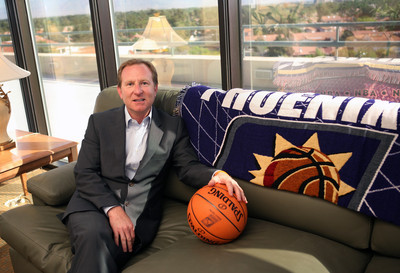With banking in his blood, exec takes on Southwest marketplace
Robert Sarver didn't cut his teeth on bank accounting ledgers, but he did start working as a part-time mortgage loan agent and internal auditor at his father's thrift, American Savings and Loan in Tucson, Ariz., at age 16.
Seven years later, he became the youngest person to found a national bank -- National Bank of Arizona -- where he served as chief financial officer.
Since then, Sarver has built, expanded and sold both banks and real estate. He is chairman and chief executive officer of Western Alliance Bancorporation and oversees banks in California, Arizona and Nevada, including Bank of Nevada.
Although the real estate industry's downturn has left banks with bad loans, Sarver is confident his institution will recover and thrive.
He enjoys the success of the National Basketball Association's Phoenix Suns, in which he bought a majority ownership four years ago.
Question: Why did you decide to buy an NBA franchise?
Answer: If you're a competitive person, professional sports are great. It's great entertainment. It's been a lot of fun. The NBA is a very well-run business. In the last four years, (the Phoenix Suns has) been one of the top teams in the league.
Question: Will Las Vegas ever get an NBA team?
Answer: I'm chairman of the committee for the NBA that's evaluating Las Vegas. The issue has been betting on professional basketball. With (plans for) an NBA-style arena in Las Vegas, I would hope that at some point in the near future we would get a team here.
Question: How did your career start?
Answer: My dad developed and managed three hotels in Tucson, as well as American Savings and Loan.
Later, I started National Bank of Arizona in 1984. We sold the bank to Zions Bancorporation out of Salt Lake City in 1994.
(Separately) in 1990, I and a partner started Southwest Value Partners. We started buying land and apartments in Arizona from the (Resolution Trust Corp., which sold assets of failed savings and loan associations). In 1994, we sold the apartments.
Then, we were buying mainly high-rise office buildings in downtown San Diego and Los Angeles. (Office buildings) were selling for a fraction of the replacement costs. We ended up acquiring more than 50 percent of the Class A office buildings in downtown San Diego. We sold the (office building) portfolio approximately four years later.
I also put together about a dozen investors, and we bought Grossmont Bank in San Diego. Zions Bancorporation was a partner with me in acquiring the bank.
Shortly thereafter, Zions and I bought a $6 billion (asset) Sumitomo Bank of California. I ran the California operation which we renamed California Bank & Trust. After three years, (Zions) bought my 5 percent.
That's when I joined forces with Bill Boyd and Art Marshall at BankWest of Nevada. I made a $20 million investment in the company, and we took that capital plus another $80 million that shareholders put in and we used that to expand the operation into Arizona and California.
Today, we've got about $5.2 billion in assets. We also manage about $2.5 billion in investment assets through Premier Trust (of Nevada), Miller/Russell & Associates of Phoenix and a company in Colorado called Shine Investments.
Question: What's your management style?
Answer: I like to let people know where they stand all the time. I'm passionate about our business, and I like our employees to be passionate, too. I'm fairly results-oriented. At times, maybe I could be seen as someone that demands more, but someone who also is willing to share more. When I came in, we expanded the stock ownership for the employees.
Question: Why are the economy and banking going through a bust now?
Answer: The bank industry gave out a lot of mortgages to people who shouldn't have had them. Flipping 180 degrees today, I think we're (now) operating in a market driven more by panic.
(At Western Alliance), we weren't a subprime mortgage lender. We didn't do leveraged buyout (lending). We weren't financing condominium conversions of apartments. We weren't doing high-rise condominiums.
We prepared for a real estate downturn, whereas, a number of our competitors just thought this market was going to boom forever and ever.
We have the capital, the product array, the sophistication of a larger bank but yet deliver those products and services on a personal basis like a smaller bank. Our regulatory capital at the end of the year was $466 million, compared with 2002, when we were $103 million.
Question: What is your outlook for the state's economy?
Answer: While Nevada has been hit as hard or harder than any states in the country recently, I also think it will be one of the first markets to turn around and recover as some of the jobs come on line for hotel rooms that are being built.
Contact reporter John G. Edwards at jedwards@reviewjournal.com or 702-383-0420.
VITAL STATISTICS Name: Robert Sarver Age: 46 Position: Chief executive officer and chairman of Western Alliance Bancorporation; majority owner of the Phoenix Suns of the National Basketball Association. Family: Wife, Penny; sons, Max, Jake and Zach. Education: Bachelor's of business administration from the University of Arizona; certified public accountant. Work history: Founder of National Bank of Arizona; co-founder and executive director of Southwest Value Partners; chairman and CEO of Grossmont Bank, investor in California Bank and Trust; chairman and CEO of Western Bancorporation; and majority owner of the Phoenix Suns. Hobbies: Watching his sons play sports. Favorite book: "The Answer: Making Sense of Life, One Question at a Time," by Jennifer Krause. Hometown: Tucson, Ariz. Quotable: "While Nevada has been hit as hard or harder than any states in the country recently, I also think it will be one of the first markets to turn around." Western Alliance Bancorporation is at 2700 W. Sahara Ave. and can be reached at 248-4200.

















